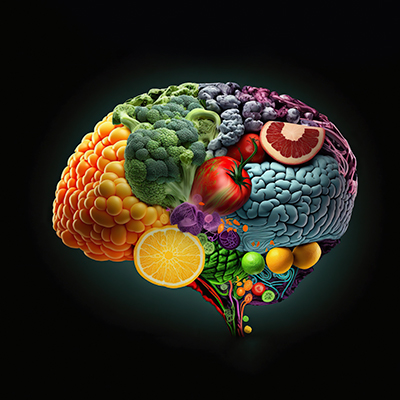Metabolism
All information about "Metabolism" and the related magazine articles can be found here.
Our articles are written clearly and link to scientific studies where relevant. This is how we meet our own standards: we regularly deliver new, high-quality content for you—free of charge, no sign-up required, with the highest possible benefit to you.

Getting all the vitamin B12 you need in a vegan diet
Those on a vegan or vegetarian diet should pay more attention to whether they have an adequate supply of vitamin B12. Find out more now

Get rid of bladder infections!
Almost every woman has had a urinary tract infection, and some suffer from it regularly. Find out why we should take this infection seriously, how it develops and what types of treatment are available!

About vitamin B12 deficiency and pain
We all know that B vitamins are very important for our health. But many people don't realise how serious a vitamin B12 deficiency can be! Not just for vegetarians, vegans, pregnant or breastfeeding women, diabetics or even alcohol drinkers!

L-threonine - an essential amino acid with important functions
Amino acids are an important building block for our health. Which ones can the body produce and which ones need to be ingested in order to fulfil all functions? What are the risks for vegans and what are the dangers of a deficiency? Our report answers the most important questions!

Why NADH is important for the body
They are the basic building blocks of the body: cells. Their job is to absorb nutrients and use their energy for metabolism. An important factor in this process is NADH.

The link between L-Arginine and women's health
The amino acid L-Arginine is primarily associated with muscle growth and improved endurance. Some studies suggest that it may also have a positive effect on women's health.

Zinc deficiency: important facts for your health
Discover the effects of zinc deficiency on your health and how to recognise and treat it. Find out why zinc is an essential trace element for your body and mind, and how to maintain optimal zinc levels. Improve your health with this comprehensive information on zinc deficiency!

Fitter and stronger with L-Carnosine?
Although carnosine can be produced by the human body, it is a popular supplement among athletes - in powder or capsule form. In this article, you can find out what specific effects it has on performance and what other functions it is involved in.

Magnesium: How does it affect the menstrual cycle?
Many women are familiar with them and suffer from them every month: Menstrual cramps. Read more about the processes in your body during your period, discover natural approaches to relieve the pain and find out what role magnesium and other nutrients play in this. Improve your quality of life during your period in a completely natural way!

Heartburn - an annoyance and a burden!
Many people suffer from heartburn after a hearty meal. You have a glass of wine or beer, treat yourself to a nice dessert or even a little digestive liqueur - and there it is again: a sharp pain, pressure in the stomach and sometimes even nausea: heartburn!

Vitamin B1 deficiency - here too
B vitamins are essential for our bodies! Not only do many metabolic processes depend on them, but so do our nerves. If you think vitamin B1 deficiency is only a problem in developing countries, think again! Find out more here.

Tribulus Terrestris is often promoted for muscle building and libido.
When it comes to muscle building and sexual health, many people prefer Tribulus Terrestris to synthetic products. But what about the real effects of the natural supplement?

Iron deficiency anaemia
Iron is an essential trace element. But why is it so important for survival and how is it linked to anaemia or even depression? Here we explain the most important consequences of iron deficiency!

Collagen hydrolysate - what to look out for
Hydrolysed collagen is more easily absorbed by the body than normal collagen. All you need to know about the supplement

Diet for osteoarthritis - how supplements can help
Now there is support for the joints - with a healthy diet and the right supplements.

Irritable bowel syndrome - causes, symptoms and treatment

Acidic foods
What is an acid-base balance? And how can I achieve it? Which foods are metabolised in an acidic way and which in an alkaline way? Our report answers the most important questions on these topics!

SAMe - for more energy and a better mood
Learn how the amino acid S-adenosylmethionine (SAMe) can support your mood, energy levels and liver function.

Why the body needs a good supply of selenium
Immune defence, the cardiovascular system and the thyroid - the trace element selenium plays an important role in many bodily functions.

Lose weight with amino acids
We have learned that our muscles use energy. The more muscular the body, the more energy it can use. Find out how amino acids are involved here!

Tryptophan - for wellbeing and sleep

What should people with diabetes not eat?
Everyone talks about sugar, but what does it mean when blood sugar levels become a serious problem? Find out all you need to know about diabetes!

Nattokinase - what is the fibrinolytic protein?
The enzyme nattokinase, derived from the soya bean dish natto, is believed in Japan to be one of the reasons for longevity. Find out more here!

Copper deficiency - causes, symptoms and long-term effects
Copper is essential for our health. Not only does the immune system need this trace element, but many other processes in the body do too. Find out here why a copper deficiency is often discovered too late and what the consequences are!
Understanding your metabolism: What you need to know to optimize it
Have you ever wondered why some people seem to stay slim effortlessly, while others constantly struggle with their weight? Or why you feel energized after certain meals and just tired after others? The key to these mysteries may lie in your metabolism!
How does the metabolism in our body work?
Metabolism, also known as metabolism, comprises all the biochemical processes in our body that are necessary to generate, store and use energy [1]. It is important because it supports vital functions such as respiration, digestion, cell repair and growth.
It consists of two main processes: anabolic (building up) and catabolic (breaking down) energy metabolism. In anabolic metabolism, molecules are built up and energy is stored, while catabolic metabolism breaks down larger molecules into smaller ones to release energy [3,4]. These processes take place continuously, even when we sleep.
What factors influence the metabolism?
Energy metabolism is influenced by various factors, including age, gender, genetics, muscle mass, hormonal balance and lifestyle factors such as diet and physical activity. With increasing age, energy metabolism tends to decrease, while muscle mass and physical activity can have a reverse effect [2].
Can you really speed up your metabolism?
Yes, the biochemical processes can be accelerated by various measures. Regular physical activity, especially strength training, can promote muscle building, stimulate fat burning and effectively increase the basal metabolic rate. Certain foods and spices such as green tea, hot peppers and protein-rich foods can also cause a small increase in fat metabolism by activating enzymes that support the breakdown of carbohydrates [2]. L-carnitine, for example, can support fat burning.
Which foods promote a healthy metabolism?
Foods that are rich in protein, fiber and healthy fats promote a healthy metabolism. These include [2]:
- Lean meat such as chicken and turkey
- Fish such as salmon and mackerel, eggs
- Nuts such as almonds and walnuts
- Seeds such as chia seeds and linseed
- Whole grain products
- A variety of fruit and vegetables
How does exercise affect the metabolism?
Exercise, especially intensive training and strength training, increases energy expenditure both during exercise and during rest periods afterwards. Regular physical activity helps to build muscle mass, which increases basal metabolic rate and boosts energy metabolism in the long term [2]. Aerobic exercises such as running, swimming or cycling are also effective in improving energy metabolism [2].
What are the most common metabolic disorders and their symptoms?
Zu den häufigsten Stoffwechselstörungen gehören [5,6,7]:
- Hypothyroidism (underactive thyroid gland): Symptoms may include fatigue, weight gain, sensitivity to cold and depression.
- Hyperthyroidism (overactive thyroid): Symptoms include weight loss, nervousness, excessive sweating and palpitations.
- Diabetes mellitus: symptoms include increased thirst, frequent urination, tiredness and blurred vision. Here you can find out what diabetics should not eat.
- Metabolic syndrome: symptoms include obesity, high blood pressure, high blood sugar levels and high cholesterol levels.
If a metabolic disorder leads to obesity, this can cause a number of secondary diseases, including osteoarthritis. Osteoarthritis is a joint disease caused by the breakdown of cartilage.
Did you know that the trace element selenium can regulate thyroid hormones as an important antioxidant? Find out more about it here,
How do hormones influence the metabolism?
Hormones such as insulin, thyroxine, cortisol and adrenaline play a central role in the regulation of metabolism [8]. Insulin regulates blood sugar levels and promotes the uptake of glucose into the cells. Thyroxine influences energy consumption and the body's basal metabolic rate. Cortisol, also known as the stress hormone, regulates sugar and fat metabolism and can slow down energy metabolism if it is chronically elevated. Adrenaline, also known as the fight or flight hormone, mobilizes energy reserves and temporarily increases energy expenditure [2].
Vitamins can also play a role. You can find out more about vitamin B6 and its influence on processes in the body here.
What role does the metabolism play in weight loss?
Energy metabolism determines how many calories the body burns at rest and during activity. A higher metabolism means that the body uses energy more efficiently and burns more calories, which helps with weight loss. Food intake and exercise are key strategies to optimize biochemical processes and support weight loss. A balanced diet with a moderate calorie deficit and regular exercise is crucial for successful long-term weight loss [2].
Which myths about metabolism are widespread?
A common myth is that people with a slow metabolism cannot lose weight. In fact, food intake and exercise play a greater role than the individual's metabolism.
Another myth is that small, frequent meals can greatly boost a poor metabolism, although the effect on overall metabolism is minimal. Instead, the quality and composition of food, as well as the total amount of calories consumed, is crucial for metabolic health and weight management [2].
While certain foods and activities can slightly increase energy metabolism in the short term, the effect is often minimal and not long-term. The basal metabolic rate is mainly determined by factors such as muscle mass, age and gender.
Which metabolic type am I?
The classification into different metabolic types is an approach that attempts to explain individual differences in energy consumption and energy metabolism. People respond differently to diet and exercise, partly due to genetic factors. Some tend to gain weight easily, while others tend to stay lean, regardless of their diet. Metabolic type can influence how efficiently the body utilizes nutrients and burns energy. Although this typing is not always clear-cut and individual variations are large, it can help to adapt personal diet and fitness strategies to achieve health goals [2].
There are various approaches to classifying metabolic types, but no universally recognized typology exists. The classification into specific metabolic types is scientifically controversial and not clearly proven. Although individual metabolic differences exist, they cannot simply be divided into fixed categories. Here are some frequently discussed metabolic types [9]:
- Ectomorph: People of this type tend to be lean and often have difficulty gaining weight. They usually have an active metabolism and burn calories quickly.
- Mesomorph: Mesomorphs are often athletically built, have good muscle definition and can build muscle relatively easily. They often have a balanced metabolic process.
- Endomorphic: Endomorphic types tend to put on fat easily and often have difficulty losing weight. They usually have a slower metabolism.
- Metabolic types based on food reactions: Some classifications are based on how the body reacts to different foods. For example, people may react differently to high carbohydrate, high protein or high fat diets, which affects their metabolic type.
- Genetic and hormonal differences: Some approaches consider genetic and hormonal factors that may cause impaired metabolism, such as insulin sensitivity, thyroid function and other hormonal regulation [2]. Genetic factors play a role, but lifestyle factors such as diet and exercise often have a greater influence.
It is important to note that metabolic types are often a mixture of different characteristics and are not clearly delineated. Determining an individual's metabolic type can therefore be a complex matter and often requires an individualized approach, taking into account various factors such as genetics, lifestyle, dietary habits and physical activity [2].
Guide to determining your metabolic type and how to use it
Self-observation and analysis
Start by observing your physical reactions to different diets and activity levels. Note how you feel after certain meals - whether you have quick energy or feel tired, how long the feeling of fullness lasts and how your body reacts to different types of physical activity.
Take genetic influences into account
Find out about family predispositions regarding energy metabolism and weight regulation. People in the same family often tend to have similar metabolic patterns, which can give clues to your own metabolic types.
Professional support
Consult a nutritionist or endocrinologist for a personalized metabolic analysis. You can have tests performed that measure metabolic parameters such as resting metabolic rate and responses to specific foods to more accurately determine your individual metabolic type.
Adaptation of diet and lifestyle
Based on your observations and the results of the tests, you adjust your diet and exercise patterns. For example, if you find that you respond well to high-carbohydrate meals and feel energized after protein meals, you can adjust your diet accordingly. Similarly, you can optimize your exercise program by choosing activities that match your metabolic types - be it intense training or gentler forms of exercise [2].
Long-term monitoring and adjustment
Energy metabolism can change over the course of a lifetime, influenced by age, hormone levels, lifestyle and other factors. Stay alert to changes and adjust your strategies accordingly to support your long-term health goals [2].
By having your energy metabolism analyzed and adjusting your diet and lifestyle accordingly, you can make more targeted decisions that promote your health and well-being [2].
At a glance
A well-functioning metabolic process is crucial for health and well-being. You can support and optimize your metabolism through targeted measures:
- regular exercise
- a balanced diet
- Minimization of stress
By consciously addressing the factors that influence metabolism and incorporating healthy habits into your daily life, you can not only better control your weight, but also increase your energy and improve your quality of life [2].
Sources
[1] https://flexikon.doccheck.com/de/Stoffwechsel
[2] https://www.ncbi.nlm.nih.gov/pmc/articles/PMC6019055/
[3] https://studyflix.de/biologie/katabolismus-2621
[4] https://flexikon.doccheck.com/de/Anabolismus
[5] https://www.deutsches-schilddruesenzentrum.de/wissenswertes/schilddruesenerkrankungen/
[6] https://www.bundesgesundheitsministerium.de/themen/praevention/gesundheitsgefahren/diabetes
[7] https://www.internisten-im-netz.de/krankheiten/metabolisches-syndrom/was-ist-ein-metabolisches-syndrom/
[8] https://blog.ksb.ch/wissen/die-wichtigsten-hormone/
[9] https://www.focus.de/gesundheit/ernaehrung/sind-sie-ekto-meso-oder-endomorph-der-stoffwechsel-entscheidet-darum-nehmen-manche-menschen-einfach-nicht-ab_id_125536560.html
